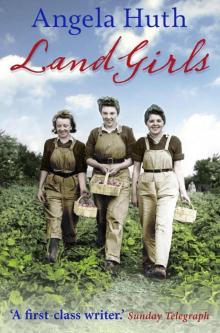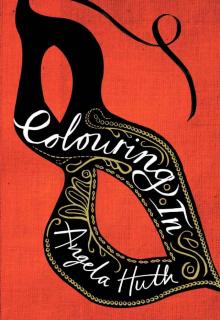- Home
- Angela Huth
Invitation to the Married Life
Invitation to the Married Life Read online
INVITATION
TO THE
MARRIED
LIFE
Angela Huth
Contents
Part 1
THE INVITATIONS 1
Part 2
THE PARTY
‘Marriage ought to be the object of universal respect . . .’
Balzac
Part One
The
Invitations
THE POWER of Rachel Arkwright to annoy her husband Thomas, always active, was particularly strong at eight in the morning. For her, breakfast was the most dangerous time of day. It was then, unwittingly, several times a week, she would find herself making the first mistake. Sometimes she would determine to keep silent. But even silence was no armour against his irritation.
‘What’s the matter now?’ he would demand. ‘Bad night again? No, don’t tell me about it.’
And Rachel would sigh, trying to weigh up whether it was worth answering the question, or whether to keep her vow of not speaking until it was time to say her daily, lustreless goodbye.
It had not been as bad when the children were at home, although Thomas had still dominated breakfast, ensuring his general air of displeasure made its effect. Jeremy, who had never been afraid to stand up to his father, would occasionally goad him with some left-wing view of whatever was in the news. They would shout at each other, bang down mugs, slopping coffee over the sides to make rings on the beeswaxed wood of the table. But at least it was their row, not Rachel’s responsibility. She and Helen would exchange minimal looks, nothing so unsubtle as a raised eyebrow – they had learned that lesson many years ago. To Thomas, a raised eyebrow was an indication of ganging up against him, betrayal. He would become further enraged, shout abuse which – possibly – he did not mean. So mother and daughter had pared their solidarity down to a look of recognition invisible to the outside eye, and indeed to Thomas, who in many ways was not an observant man.
Nowadays, Rachel desperately missed the protection of the children. The daily tension of trying not to do the wrong thing made her clumsy. She would burn toast, break fried eggs, spill salt. The bones of her hands were bleached ridges shining through the skin. In the mornings she felt old.
Today, a Tuesday in early summer, was one of the silent mornings – an irascible silence on Thomas’s part. This he made clear by breaking it with noisy pecks at his coffee, and impatient slashing at the newspaper as he turned its pages. Last night he had been at a business dinner. He had returned home after midnight complaining of a headache. Mornings after business dinners were particularly fraught with danger.
Rachel pushed away her finished grapefruit and looked at the familiar sight opposite her. There he was, a caricature of a husband, almost completely hidden – guarded against her – by the Daily Telegraph (he had recently switched from The Times). Two pinkish blobs of fuzzy-backed hands held the pages wide open. Rachel could visualise the equally familiar sight of Thomas’s lower half beneath the table: plump pinstriped knees and calves, solid ankles in socks of wrinkled grey wool, feet trussed up in expensive leather shoes. She often marvelled at the heaviness of Thomas: he had been almost bony as an undergraduate. On the rare occasions she had to experience his weight, she would shut her eyes against the bulge of his stomach and think of him by day. Dressed, his bulk (which was well proportioned) was enhanced by the tightness of his clothes. His tailors had orders to take in seams as far as they would go, streamlining his suits in a way that was appropriate to far thinner men. Thomas’s vanity screened him from reality. He did not think of himself as a fat man.
Rachel laid her hand over the small pile of letters on the table beside her. The slight anticipation they afforded her every morning was a small, secret comfort. She had always enjoyed both writing and receiving letters, though it seemed to be a dying art these days, and not many came her way. Jeremy’s only communication in term was a reverse charge call from Cambridge once a week to absolve himself of guilt. Helen wrote quite often – warm, funny letters that made life at Durham sound more entertaining than it really was. Rachel looked forward to hearing from Helen. She would read the new letter several times, when Thomas had gone, and store it with the collection of others in her desk. Mostly, though, the pile was disappointing: bills, reminders from the dentist, witless duty postcards from friends abroad.
This morning Rachel observed, with an excitement out of all proportion to the event, an expensive white envelope at the bottom of the brown ones. She pulled it out, examining it carefully. Black ink, large arrogant handwriting. Postmark: Northampton. The Farthingoes, obviously. . . . Rachel slit open the envelope. In her exhilarated state she forgot that the noise of tearing paper would be bound to annoy Thomas; and suddenly she didn’t care.
The thick white card, beautifully engraved, was indeed from the Farthingoes.
‘Thomas,’ said Rachel, fingering the card with all the reverence of a woman who once used to love parties and cannot quite discard the habit, ‘Frances and Toby have asked us to a ball.’
There was a moment’s terrible silence. Rachel could imagine her husband’s eyes blazing to the end of a sentence. She could hear her own heart thumping very fast. Once again, in her foolish excitement, she had made an irretrievable mistake and would now have to bear the consequence.
‘When?’ asked Thomas at last.
The question, a chip of ice in the warmth of Rachel’s expectancy, was devoid of all interest. Its single, tiny sound managed brilliantly to convey the uprising of his annoyance.
‘September.’
Thomas put down the paper at last, folding it untidily. His reddish eyebrows, raised, scratched at the furrows on his brow – incredulous, scathing, bored.
‘That’s in four months’ time, for heaven’s sake.’
‘You have to ask people very early if you want to be sure of their coming.’
‘Ridiculous system.’
Their eyes met. As usual, Thomas’s lower lashes were divided into three pointed clumps. They made his pale eyes look startled as a starfish, rather silly. Years ago, when they were first married, Rachel had laughed at them. Thomas, willing in those days to please her, had allowed her to brush them apart with a small mascara brush bought especially for the purpose. But the practice had been given up long ago. Rachel had grown accustomed to the look of silliness that fronted his sharp, agitated mind, so that it only struck her at bad moments. And possibly, to be fair, it was something she alone saw. Many women mentioned his handsomeness.
‘Shall I accept?’
Thomas sighed. It occurred to Rachel he was attempting to exercise self-control. For her part, she tried to dim the light she knew must be fulminating in her own eyes. That would be bound to go against her.
‘I suppose so. You obviously want to go. Though what the middle-aged want to give balls for I can’t imagine. A more ridiculous way of spending money -’
‘Thank you.’
Rachel’s heart increased its pace, making her careless again. Anticipation (of a far higher order, of course, than the actual party would be) suffused her in an amorphous golden cloud that she would not attempt to describe. But could not resist blurting out some trivial thought to indicate its presence.
‘We’ll have to get your dinner jacket cleaned,’ she said, knowing even as she uttered the words she had gone too far this time.
Thomas stood up. A purple flush enlivened his jowls.
‘For God’s sake, Rachel, do we really have to think about the cleaning of my dinner jacket four months ahead?’
Thomas took in the shape of Rachel: grubby towelling dressing gown pulled tightly in at the waist so that the (once flat) stomach protruded. Why would she never dress for breakfast? H
er hair, unbrushed, more grey than auburn now, was backlit from a pale light from the window. Two-dimensional London trees outside, still the piercing green of mid-May, slightly moved their fretwork of leaves. Small shadows jiggled on the table. Butter on a dish shone so fiercely yellow that it hurt Thomas’s eyes: he transferred his gaze to the cloudy ambers of marmalade in a glass jar, and then to the jug of bluebells slumped over the pottery sides of their jug. Rachel had picked them in the country last weekend and should have thrown them away two days ago, but she was disinclined to throw away flowers until they had reached the papery state of their death, no matter how often Thomas objected.
Had Bonnard been present, thought Thomas, and approached his canvas with half-shut eyes, he could have painted the kind of Still Life with Breakfast and Wife that would have made people dread middle age.
Rachel blinked, dryly. Once her eyes had been gold. She had been introduced to Thomas as the only girl at Oxford with genuinely gold eyes. That had been 1961. In London, nearly thirty years later, she was now the only woman he knew with eyes the colour of washing-up water. That was it, a sort of creamy dun. Colourless as oatmeal, flecked with faded saffron. The mean thoughts made him smile.
‘Late again tonight,’ he said. ‘Nottingham all day, blast it.’ He abandoned the hypocrisy of kissing his wife on the cheek, and left in a hurry.
Rachel, standing breast-high in her invisible cloud, was glad to see him go. She had her own life and this morning, as every morning, she was eager to get back to it.
For Thomas, driving slowly up the crowded M1, the prospect of the day ahead was not a happy one: a meeting with some French importers in the morning, board meeting in the afternoon. He had agreed to meet Gillian at The Wine Bar for lunch, and it was this plan he dreaded most of all. For today, Thomas had decided last week, would be the one he would take the bull by the horns (Gillian’s language) and tell her it was all over – curtains, finito. If he used her own favourite expressions, perhaps she would understand and not make too much fuss, though this was unlikely. Gillian was a determined young feminist; any man who stepped out of line with her paid for it. Thomas had experienced many a thwack of her clichéd verbal abuse. He was often puzzled, considering how short he fell of the mark in her eyes, why she should wish to go on seeing him. All men were bastards, including Thomas. What she did not seem to realise was that he had no interest in proving her wrong. She also seemed to have no inkling that their association, as it had been from the beginning, was a disaster. Wiping the slate (heavens, it was catching) would be a relief. Normally, Thomas would not have baulked at the thought of a rough termination (he had weathered many in the past), but today the wretched headache was a hindrance. His mind was staggering uncertainly about, when it should have been braced, ready to fire accurately. Maybe, by late morning, things would have improved. He dabbed his temples with a handkerchief. A few years ago it would have been a cologne-scented handkerchief. Now, Rachel had given up buying him cologne. He missed it, along with the small surprises of Glenmorangie, cashmere socks, Bendicks Bitter-mints and gravad lax that she used frequently to arrange. But it was impossible to mention that he had even noticed the disappearance of such things, let alone minded that they were no longer part of his married life.
By five-past-twelve, when the two Frenchmen left his office, Thomas felt no better. The last of his energies had been exhausted by speaking French for half-an-hour, which had greatly held up the proceedings, and had not been necessary. The French clients were proficient in English, but to speak to them in their own language was a matter of pride to Thomas. He abhorred the general British lack of talent at foreign languages, and was determined to prove that not all English businessmen were uneducated. Besides which, meetings conducted in a foreign language deterred the arrogant Doug, managing director of the firm, from interrupting as often as normal. Doug’s talents – and Thomas had to concede he was an able man – did not include speaking French, though he kept up the pretence that he was absolutely au fait with everything that was going on. I may not be much of a linguist when it comes to the spoken word, he had once explained to Thomas, but as for understanding, I’m right there with the best of them.
‘Everything understood, then?’ Thomas asked him, aware of his meanness for the second time that morning, when the Frenchmen had gone.
‘Of course, Tom. All be in hand by the end of the month.’
On Doug’s notepad were several long, unknown words (phonetically spelled) which he would be obliged to look up in the dictionary at home this evening.
‘Good,’ said Thomas, getting up from his leather armchair, a fat hand splayed over his aching forehead. ‘I’m off for an early bite. Wouldn’t mind a breath of air before the session this afternoon.’
As he left the office he was aware of Doug’s disapproval. Hell, it was his firm. Why shouldn’t he come and go when he liked? Doug knew perfectly well that most of Thomas’s thinking and planning, concerning the business, was not done in the office. Profits showed there were no flaws in this method. All the same, he could never be totally impervious to Doug’s silent disapprobation. It annoyed him.
Out in the street a small wind touched his stricken temples. An idea came to him: he would slip along to The Gallery. There had to be some joy in a man’s day, and he had promised himself to take another look at the beachscape he fancied. It would do no harm to keep Gillian waiting. On the one occasion he had been punctual her delight had been so extravagant he determined never to be on time again. Her chiding was easier to stomach.
In the silent gallery, with its soft carpets, white walls and gentle spotlights, Thomas felt peace at last. The girl at the table, writing, head bowed, took no notice of him. He had not seen her before. She had long amber hair. A small, dead white hand protruded from an over-long woollen sleeve, a translucent perspex ring on the middle finger. Funny, Thomas thought, how the young these days are so addicted to clothes that are much too big for them. Did they represent some sort of refuge, some sort of necessary camouflage against hard eyes? Or were they merely the innocent uniform of youth? Thomas had once ventured to ask his daughter why she was so attached to a grubby Viyella shirt that reached to her knees, billowing over a vast ethnic skirt. ‘Oh, Dad, really, what d’you think?’ had been Helen’s inadequate reply.
Thomas turned his attention to the pictures, a collection of watercolours by an artist unknown to him. By jingo, he thought – just as he had on the previous occasion – the man can paint. Jealousy seared his heart. He would have given anything to have such talent, the skill to edge the paint to so perfect a hard line, to smudge the colours together in a way that made their moment of fusion almost imperceptible. Dammit. A lifetime in his studio at home, and he’d never achieve a tenth of the effect of this R. Cotterman. Thing to do, of course, would be to take a picture home, study the technique with a magnifying glass, have yet another try. . . . He found the one he had remembered, stood in front of it for a long time. Such simplicity! A pallid beach, a flat sea (amazingly, it seemed to have been painted with a single stroke: how could that be? what manner of brush, for heaven’s sake?). A luminous grey sky. A single moment, caught by just one man.
Thomas made up his mind. He strode over to the table.
The amber hair parted. A shining white face, to match the hand, tilted up at him. Grey, unexpectant eyes met his. There was a strange, almost tangible tranquillity about the girl. Or perhaps, thought Thomas, she was just bored stiff working all day in a gallery that almost no one visited. Inured by rare customers who hardly ever bought a picture, she seemed drained of all anticipation. Her pale face revealed nothing but nonchalance.
‘I’ll take the seascape, if I may,’ said Thomas. ‘The one in the corner. Norfolk: Early Morning.’
The grey eyes flickered, surprised, disappointed. ‘It’s three hundred and fifty pounds,’ she said, so softly Thomas could scarcely hear.
‘Worth every penny,’ he said, and wrote out the cheque.
The girl wrapped t
he picture in several sheets of new brown paper. Thomas watched, fascinated, as she tied string into several small, efficient knots. He was surprised at her expertise, considering that the navy lambswool sleeves fell right over her thin fingers, but she made no attempt to push them back. Finally the parcel was finished. Thomas, glancing at his watch, realised it had taken ten minutes, for all her skill. It had been a very fast ten minutes. His headache, he realised, had quite gone.
‘That be all right?’
‘Fine. Thanks.’
‘I’m sad to see it go, to be honest. It was my favourite.’ She gave Thomas the merest smile, then glanced towards the empty corner.
‘Oh dear, I am sorry if I’ve deprived you.’
The girl shrugged. ‘Can’t be helped. If I was a real pro, I’d be pleased we’ve made a sale. My trouble is, I fall in love with pictures much too easily, can’t bear to see them go.’
Thomas smiled, sympathetic. ‘What’s your name?’ He hadn’t known he was going to ask any such impertinent question.
‘Serena.’
Thomas was relieved she answered with the swiftness of a girl who did not mind such irrelevancies. Apt, her name, too.
‘Very hard, feeling like that,’ he said. ‘I’d feel just the same myself.’
Serena gave him an incredulous look. ‘Are you a painter?’
Thomas hesitated. ‘Sort of. That is, I try.’ Her incredulity lingered. ‘I’ve had my eye on this R. Cotterman for some time,’ he added. ‘In fact, I daresay I shall be back for another in the not-too-distant future.’
Serena sat down. She pulled her sleeves right down over clenched hands, defensive. ‘Will you,’ she said, but it was not a question.
Parcel firmly under his arm, Thomas hurried across the silent carpet to the door. Late for Gillian, he determined not to hurry. Confused by this girl, Serena, a mental picture of her luminous face accompanied him from The Gallery to The Wine Bar.

 Sun Child
Sun Child South of the Lights
South of the Lights Virginia Fly is Drowning
Virginia Fly is Drowning Of Love and Slaughter
Of Love and Slaughter Such Visitors
Such Visitors Once a Land Girl
Once a Land Girl Land Girls
Land Girls Colouring In
Colouring In Nowhere Girl
Nowhere Girl Monday Lunch in Fairyland and Other Stories
Monday Lunch in Fairyland and Other Stories Another Kind of Cinderella and Other Stories
Another Kind of Cinderella and Other Stories Invitation to the Married Life
Invitation to the Married Life Easy Silence
Easy Silence